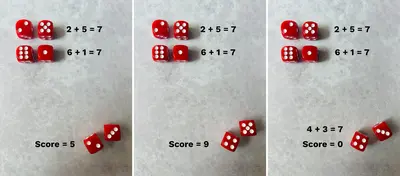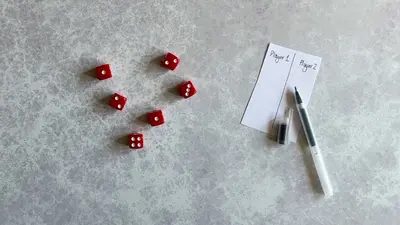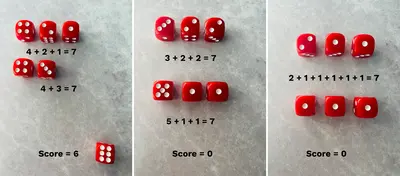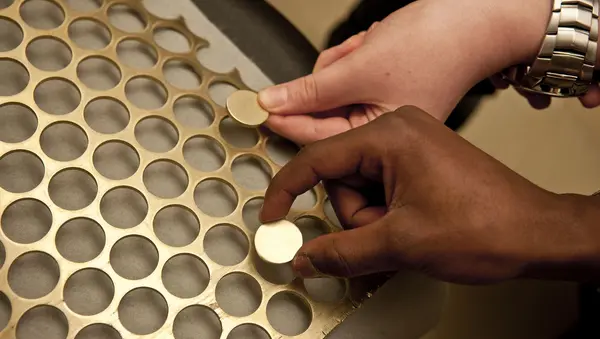How to play Sevens

Today we have another game for you that you can play anywhere, any time. All you need is six dice, and a pen and paper to keep score.
Sevens is a dice game for two or more players. The aim is to be the player with the highest score, after an agreed number of rounds. Alternatively, you can decide on a points value, e.g., 50 or 100 points, with the first person to reach that value being the winner.
How to Play
When it's a player's turn, they roll all six dice. They set aside any dice combinations that add up to 7. These dice are disqualified and don’t score any points.
The player then has a choice - they can either stop, and keep the remaining dice as their score for that round. Or, they can decide to roll the remaining dice again and try to get a higher score.
If the player rolls the dice again, the rule of 7 still applies, so if any dice on the next roll add up to 7, they are also disqualified. This means that rolling again could get you a higher score, but it could also result in a score of zero if all dice are disqualified.
The first player in each round can roll their dice up to three times in total.
Let’s take a look at an example:

On the first roll, the player has rolled two sets of 7 (2 + 5, and 6 + 1). The remaining dice add up to a score of 5 (2 + 3).
The player decides to roll the remaining dice again, to get a higher score. This time, they add up to a score of 9 (4 + 5). This is a fairly high score, keeping in mind that the highest score you could achieve with two dice is 12 (6 + 6).
However, the player decides to use their last turn, to try and get an even higher score. Bad luck! They roll a 4 + 3. This adds up to 7, so the remaining dice are also disqualified. The player’s final score is zero.

After the first player has recored their score, the dice are passed clockwise to the next player. Here’s the twist - the subsequent players can only roll the dice up to as many times as the first player. So if the first player stops after one or two rolls, either because they got a high score they want to keep or because all their dice were disqualified, then the subsequent players can also only roll once or twice in that round.
After each player has had a turn and all the scores are recorded, a new round begins. The player to the left of the player who started the last round begins this time, so that each player gets a turn rolling first.
Here's a short video showing some more examples of the game in action:
The game ends either after a set number of rounds, with the highest scoring player winning, or when a player reaches a previously agreed number of points.
Some variations
Variation 1
Only two dice being able to add up to 7. Combinations are limited to 1 + 6, 2 + 5, and 3 + 4.
Variation 2
Any number of dice can add up to 7. This allows for more combinations, but also means there are more ways to end up with a score of zero. Let’s look at some more examples:

In the first example, there are two sets of 7 - one with two dice (4 + 3), and one with three dice (4 + 2 + 1). The remaining dice is a 6, which is the highest score you can get with one dice, so it makes sense to stop there.
In the second example, there are two sets of 7, each with three dice (3 + 2 + 2 and 5 + 1 + 1). The score is zero, and the player’s turn ends.
You could even have all six dice adding up to zero, like in the third example, which also results in a score of zero and immediately ends the player’s turn.
Variation 3
All players are allowed to roll up to three times, regardless of how many times the first player in the round rolled.
Maths skills involved: number and quantity recognition, basic addition skills
Latest News and Events

STEM Ambassadors in Scotland Week 2026
STEM Ambassador in Scotland (SAIS) Week is a celebration of all things STEM in Scotland through the experiences of our STEM Ambassadors.

Active Maths Challenge
Start the year with our mini Active Maths challenge and measure what progress you can make over four weeks.

Money Maths at Museum on the Mound
We are excited to offer Maths versions of our popular money-themed schools workshops. These are entirely free of charge. Best suited for P5-P7 pupils.